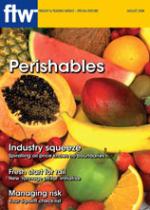AS THE global transport sector continues to labour
under profit-sapping operational costs, not least
the price of fuel, Maersk Line’s Mark Cairns is
nevertheless fairly sanguine better days could well
lie ahead.
Let us hope he and others are right, for the
prospect of oil hitting US$200 a barrel is simply too
awful to contemplate.
“Were it to reach those heady heights, there
could be be a slow-down in global trade and
changed sourcing patterns,” says Cairns, the carrier’s
director for sales and reefers in South Africa
and Namibia.
What he is fairly certain of is that the days of
US$70 p/b and up to the US$100 p/b level are
gone, and that US$110 p/b would seem more
realistic, which is in line with a forecast by respected
media organ, Containerisation International.
“If one looks at bunker prices in Cape Town
over the past four months, they have moved from
around US$560/ton to more than US$800/ton and
will hopefully stabilise for the next few months,
after which we will just have to wait and see.”
The roll-out of the AP Moller-Maersk Group’s
floating bunker adjustment factor (BAF), first
proposed last year, is just about complete on all
Maersk Line trades, with the exception of the allimportant
North Europe/South Africa (SAECS) trade,
to be implemented on October 1. (Bunker prices
account for a significant portion of the group’s
operating costs).
Cairns explains of the floating BAF: “It is pretty
much a revenue-neutral transaction, getting
our customers to share in the risk of upward
involvement in the oil price and the benefit of a
downward movement, very much like the
petrol price.”
Tough conditions notwithstanding, this promises
to be a satisfactory year for Maersk Line in reefer
cargoes from South Africa.
South African reefer growth for the first six
months of 2008 was up 1% compared to 2007 and
major growth markets were the Middle East and
Europe, where prices remained strong and exporters
diverted fruit from other markets.
He expects this pattern to continue in the
second half of 2008, due primarily to increased
exports from certain markets into China and a
market swing of some 9% in favour of containerised
over conventional shipping in South Africa. Cairns does not foresee a demise
of specialised reefer shipping in the
medium-term, pointing to the role it
plays in the huge banana trade from
South America, West Africa and certain
parts of the Far East, on top of which
he believes that the balance between
containerised and conventional
cargoes will reach a point that caters
for the market requirements for
exports from the South
African market.
“As much as we will continue to
build capacity out of South Africa, it's
really a question of balancing capacity.
This depends, of course, on the market
point of view of saying that price will
determine the financial viability for
exporters to move product
in containers.
“Price and capacity will remain
determining factors in the transport of
perishable cargo from South Africa and
we are constantly reviewing options
to assist exporters to bring their fruit
to market.”
Middle East and Europe markets remain strong
15 Aug 2008 - by Ray Smuts
0 Comments
Perishables 2008

15 Aug 2008
15 Aug 2008
15 Aug 2008
15 Aug 2008
15 Aug 2008
15 Aug 2008
15 Aug 2008
15 Aug 2008
15 Aug 2008
Border Beat
Featured Jobs
New
New
